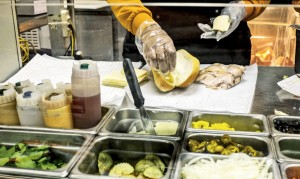
Posted by Natalie van Hoose-Purdue
Before you take a bite out of that sub, consider this: Regular cleaning at retail delis may not take care of a dangerous type of bacteria.
New research finds that 6.8 percent of samples taken in 15 delis before operation began for the day tested positive for Listeria monocytogenes bacteria, which can cause a potentially fatal disease in people with vulnerable immune systems.
In a second sampling phase, 9.5 percent of samples taken in 30 delis during operation over six months tested positive for L. monocytogenes. In 12 delis, the same subtypes of the bacteria cropped up in several of the monthly samplings, which could mean that the bacteria can persist in growth niches over time.
“This is a public health challenge,” says Hayley Oliver, assistant professor of food science at Purdue University. “These data suggest that failure to thoroughly execute cleaning and sanitation protocols is allowing L. monocytogenes to persist in some stores. We can’t in good conscience tell people with weak immune systems that it is safe to eat at the deli.”
In healthy people, eating food contaminated with L. monocytogenes may lead to common food poisoning symptoms such as diarrhea or an upset stomach. But the bacteria can cause listeriosis—a serious systemic infection—in immunocompromised people such as the elderly, infants and children, pregnant women, and people with HIV.
In severe cases, L. monocytogenes can pass through the intestinal membrane and into the bloodstream or cross the blood-brain barrier. The bacteria can also cross the placental barrier in pregnant women, which can trigger abortion.
‘Wild West’ of Lunch
Ready-to-eat deli meats are the food most associated with L. monocytogenes, which, unlike Salmonella and E. coli, can grow at refrigerator temperatures.
Stringent control measures and inspections have tamped down the presence of L. monocytogenes at meat processing plants, but there are no regulations specific to Listeria for retail delis. Recent risk assessments suggest that up to 83 percent of listeriosis cases linked to deli meats are attributable to products contaminated at retail.
“It’s kind of the Wild West,” Oliver says. “Manufacturing has a zero-tolerance policy for Listeria, but that dissipates at the retail level. The challenge of developing systematic cleaning procedures for a wide variety of delis—which are less restricted environments than processing plants—can make Listeria harder to control.”
For the study, published in the Journal of Food Protection, researchers tested for L. monocytogenes and other Listeria species in 30 delis in national supermarket chains in three states. The researchers swabbed surfaces that come into frequent contact with food, such as meat slicers and counters, and surfaces that typically do not.
About 30 percent of the delis never tested positive for the pathogen, while some delis tested positive in 35 percent of the samples collected over six months.
“The prevalence of L. monocytogenes is higher than we expected in a significant percentage of delis, and the bacteria is persisting in these delis over time,” Oliver says.
Most of the positive samples were collected from surfaces that usually do not come into contact with food, such as floors, drains, and squeegees. But the bacteria can be transferred unintentionally from these surfaces to food.
While the percentage of L. monocytogenes found on food contact surfaces was low, “these numbers would never be acceptable in manufacturing,” Oliver says. “The reason we haven’t had a listeriosis outbreak tied to a deli is because it’s a disease with a long incubation time, and it’s difficult to track to a source. There are only about 1,600 listeriosis cases a year. But the likelihood of death is huge.”




